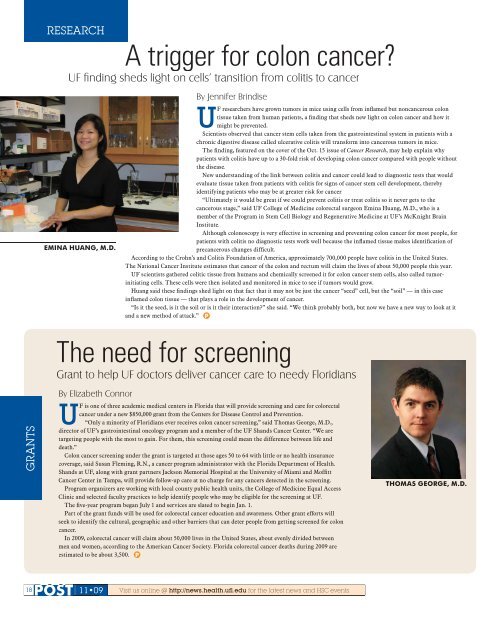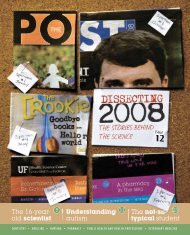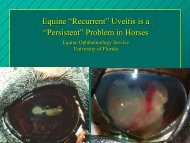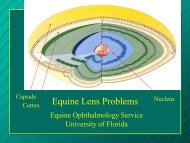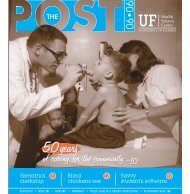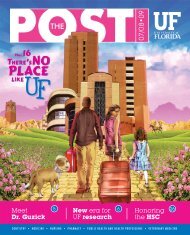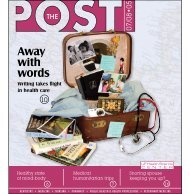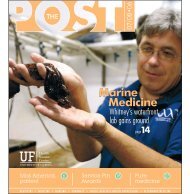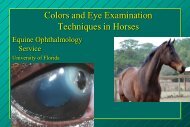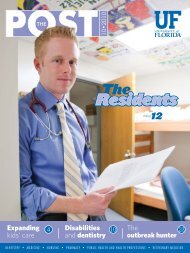New hospital opens PHHP names new dean - University of Florida
New hospital opens PHHP names new dean - University of Florida
New hospital opens PHHP names new dean - University of Florida
You also want an ePaper? Increase the reach of your titles
YUMPU automatically turns print PDFs into web optimized ePapers that Google loves.
GRANTS<br />
RESEARCH<br />
18POST 18POST POST<br />
A trigger for colon cancer?<br />
UF fi nding sheds light on cells’ transition from colitis to cancer<br />
EMINA HUANG, M.D.<br />
By Elizabeth Connor<br />
UF is one <strong>of</strong> three academic medical centers in <strong>Florida</strong> that will provide screening and care for colorectal<br />
cancer under a <strong>new</strong> $850,000 grant from the Centers for Disease Control and Prevention.<br />
“Only a minority <strong>of</strong> Floridians ever receives colon cancer screening,” said Thomas George, M.D.,<br />
director <strong>of</strong> UF’s gastrointestinal oncology program and a member <strong>of</strong> the UF Shands Cancer Center. “We are<br />
targeting people with the most to gain. For them, this screening could mean the difference between life and<br />
death.”<br />
Colon cancer screening under the grant is targeted at those ages 50 to 64 with little or no health insurance<br />
coverage, said Susan Fleming, R.N., a cancer program administrator with the <strong>Florida</strong> Department <strong>of</strong> Health.<br />
Shands at UF, along with grant partners Jackson Memorial Hospital at the <strong>University</strong> <strong>of</strong> Miami and M<strong>of</strong>fi tt<br />
Cancer Center in Tampa, will provide follow-up care at no charge for any cancers detected in the screening.<br />
Program organizers are working with local county public health units, the College <strong>of</strong> Medicine Equal Access<br />
Clinic and selected faculty practices to help identify people who may be eligible for the screening at UF.<br />
The fi ve-year program began July 1 and services are slated to begin Jan. 1.<br />
Part <strong>of</strong> the grant funds will be used for colorectal cancer education and awareness. Other grant efforts will<br />
seek to identify the cultural, geographic and other barriers that can deter people from getting screened for colon<br />
cancer.<br />
In 2009, colorectal cancer will claim about 50,000 lives in the United States, about evenly divided between<br />
men and women, according to the American Cancer Society. <strong>Florida</strong> colorectal cancer deaths during 2009 are<br />
estimated to be about 3,500. P<br />
11 11 09 09<br />
By Jennifer Brindise<br />
UF researchers have grown tumors in mice using cells from infl amed but noncancerous colon<br />
tissue taken from human patients, a fi nding that sheds <strong>new</strong> light on colon cancer and how it<br />
might be prevented.<br />
Scientists observed that cancer stem cells taken from the gastrointestinal system in patients with a<br />
chronic digestive disease called ulcerative colitis will transform into cancerous tumors in mice.<br />
The fi nding, featured on the cover <strong>of</strong> the Oct. 15 issue <strong>of</strong> Cancer Research, may help explain why<br />
patients with colitis have up to a 30-fold risk <strong>of</strong> developing colon cancer compared with people without<br />
the disease.<br />
<strong>New</strong> understanding <strong>of</strong> the link between colitis and cancer could lead to diagnostic tests that would<br />
evaluate tissue taken from patients with colitis for signs <strong>of</strong> cancer stem cell development, thereby<br />
identifying patients who may be at greater risk for cancer.<br />
“Ultimately it would be great if we could prevent colitis or treat colitis so it never gets to the<br />
cancerous stage,” said UF College <strong>of</strong> Medicine colorectal surgeon Emina Huang, M.D., who is a<br />
member <strong>of</strong> the Program in Stem Cell Biology and Regenerative Medicine at UF’s McKnight Brain<br />
Institute.<br />
Although colonoscopy is very effective in screening and preventing colon cancer for most people, for<br />
patients with colitis no diagnostic tests work well because the infl amed tissue makes identifi cation <strong>of</strong><br />
precancerous changes diffi cult.<br />
According to the Crohn’s and Colitis Foundation <strong>of</strong> America, approximately 700,000 people have colitis in the United States.<br />
The National Cancer Institute estimates that cancer <strong>of</strong> the colon and rectum will claim the lives <strong>of</strong> about 50,000 people this year.<br />
UF scientists gathered colitic tissue from humans and chemically screened it for colon cancer stem cells, also called tumorinitiating<br />
cells. These cells were then isolated and monitored in mice to see if tumors would grow.<br />
Huang said these fi ndings shed light on that fact that it may not be just the cancer “seed” cell, but the “soil” — in this case<br />
infl amed colon tissue — that plays a role in the development <strong>of</strong> cancer.<br />
“Is it the seed, is it the soil or is it their interaction?” she said. “We think probably both, but now we have a <strong>new</strong> way to look at it<br />
and a <strong>new</strong> method <strong>of</strong> attack.” P<br />
The need for screening<br />
Grant to help UF doctors deliver cancer care to needy Floridians<br />
Visit us online @ http://<strong>new</strong>s.health.ufl .edu for the latest <strong>new</strong>s and HSC events.<br />
THOMAS GEORGE, M.D.


